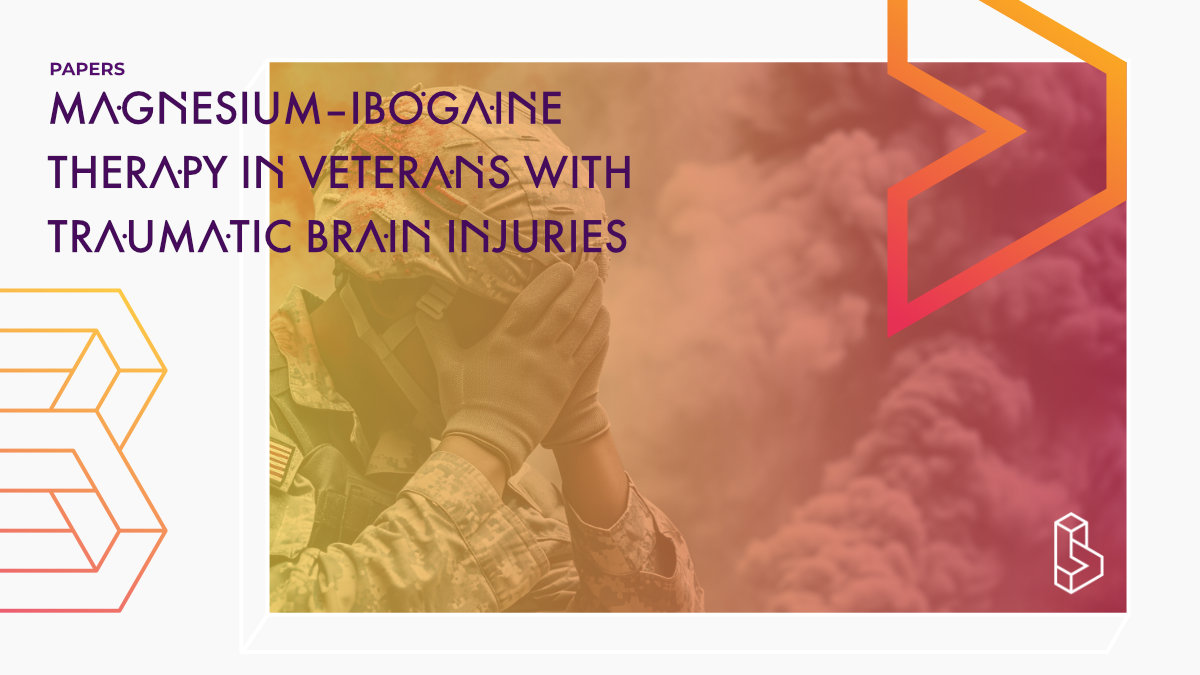This observational study (n=30) evaluates ibogaine (up to 980mg/70kg) in combination with magnesium (1-2 hours before and 12 hours later) in male Special Operations Forces veterans with predominantly mild traumatic brain injury (mTBI). The study assessed changes in disability, PTSD, depression, and anxiety immediately and one month after treatment using various scales. Results show significant improvements in functioning and psychological symptoms with no serious adverse events.
Abstract of Magnesium–ibogaine therapy in veterans with traumatic brain injuries
“Traumatic brain injury (TBI) is a leading cause of disability. Sequelae can include functional impairments and psychiatric syndromes such as post-traumatic stress disorder (PTSD), depression and anxiety. Special Operations Forces (SOF) veterans (SOVs) may be at an elevated risk for these complications, leading some to seek underexplored treatment alternatives such as the oneirogen ibogaine, a plant-derived compound known to interact with multiple neurotransmitter systems that has been studied primarily as a treatment for substance use disorders. Ibogaine has been associated with instances of fatal cardiac arrhythmia, but coadministration of magnesium may mitigate this concern. In the present study, we report a prospective observational study of the Magnesium–Ibogaine: the Stanford Traumatic Injury to the CNS protocol (MISTIC), provided together with complementary treatment modalities, in 30 male SOVs with predominantly mild TBI. We assessed changes in the World Health Organization Disability Assessment Schedule from baseline to immediately (primary outcome) and 1 month (secondary outcome) after treatment. Additional secondary outcomes included changes in PTSD (Clinician-Administered PTSD Scale for DSM-5), depression (Montgomery–Åsberg Depression Rating Scale) and anxiety (Hamilton Anxiety Rating Scale). MISTIC resulted in significant improvements in functioning both immediately (Pcorrected < 0.001, Cohen’s d = 0.74) and 1 month (Pcorrected < 0.001, d = 2.20) after treatment and in PTSD (Pcorrected < 0.001, d = 2.54), depression (Pcorrected < 0.001, d = 2.80) and anxiety (Pcorrected < 0.001, d = 2.13) at 1 month after treatment. There were no unexpected or serious adverse events. Controlled clinical trials to assess safety and efficacy are needed to validate these initial open-label findings.”
Authors: Kirsten N. Cherian, Jackob N. Keynan, Lauren Anker, Afik Faerman, Randi E. Brown, Ahmed Shamma, Or Keynan, John P. Coetzee, Jean-Marie Batail, Angela Phillips, Nicholas J. Bassano, Gregory L. Sahlem, Jose Inzunza, Trevor Millar, Jonathan Dickinson, C. E. Rolle, Jennifer Keller, Maheen Adamson, Ian H. Kratter & Nolan R. Williams
Summary of Magnesium–ibogaine therapy in veterans with traumatic brain injuries
TBI is a leading cause of injury-related disability worldwide and is likely to remain so until at least 2030. The efficacy of treatments for comorbid conditions, including PTSD, MDD and anxiety disorders, is limited, and additional treatment options are needed.
Ibogaine is a plant extract traditionally used in African religious, spiritual and healing ceremonies. It increases the transcription of neurotrophic factors and leads to dreamlike states of consciousness and a longer period of self-reflection and evaluation.
Ibogaine is classified as a Schedule I substance and has been linked to cardiotoxicity. Magnesium supplementation has been shown to reduce the Q – T interval and protect against Q – T interval prolongation when coadministered with medications that ordinarily would have such an effect.
To date, ibogaine research has focused on its potential as a treatment for substance use disorders. Some studies have noted improvements in mood, but no studies have prospectively validated effects on mood with more rigorous clinician-rated instruments.
Results
Find this paper
Magnesium–ibogaine therapy in veterans with traumatic brain injuries
https://doi.org/10.1038/s41591-023-02705-w
Open Access | Google Scholar | Backup | 🕊
Cite this paper (APA)
Cherian, K.N., Keynan, J.N., Anker, L. et al. Magnesium–ibogaine therapy in veterans with traumatic brain injuries. Nat Med (2024). https://doi.org/10.1038/s41591-023-02705-w
Study details
Compounds studied
Ibogaine
Topics studied
Traumatic Brain Injury
Study characteristics
Original
Observational
Open-Label
Participants
30
Humans
Compound Details
The psychedelics given at which dose and how many times
Ibogaine 210 - 980mg | 1x
Linked Research Papers
Notable research papers that build on or are influenced by this paper
Magnesium–ibogaine therapy effects on cortical oscillations and neural complexity in veterans with traumatic brain injuryThis analysis of an open-label observational study (n=30) found that magnesium-ibogaine therapy in combat veterans with traumatic brain injury (TBI) led to slower brain wave patterns and reduced neural complexity on EEG, which correlated with improvements in PTSD, anxiety, and cognitive function at one-month follow-up.
Linked Clinical Trial
Pre-post Evaluation of the Safety and Efficacy of Ibogaine-Magnesium Therapy in Veterans With Repeated Blast ExposureThis observational cohort study (n=30) evaluated the safety and efficacy of Ibogaine-Magnesium Therapy in veterans with sequelae of repeated blast exposure.

